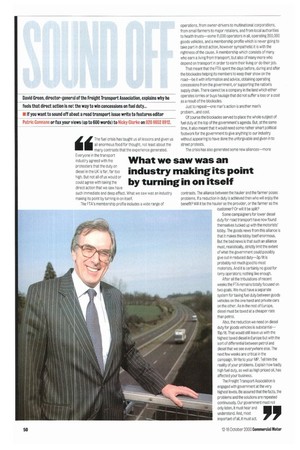David Green, director-general of the Freight Transport Association, explains why
Page 52

If you've noticed an error in this article please click here to report it so we can fix it.
he feels that direct action is not the way to win concessions on fuel duty...
• If you want to sound off about a road transport issue write to features editor
Patric Cunnane or fax your views (up to 600 wards) to Nicky Clarke on 020 8652 8912.
d The fuel crisis has taught us all lessons and given us
all enormous food for thought, not least about the
diesel in the LIK is far, far too industry making its point
high. But not all of us would or could agree with taking the direct action that we saw have such immediate and deep effect. What we saw was an industry making its point by turning in on itself.
The FTA's membership profile includes a wide range of operations, from owner-drivers to multinational corporations, from small farmers to major retailers, and from local authorities to health trusts—some 11,000 operators in all, operating 200,000 goods vehicles, and a membership profile which is never going to take part in direct action, however sympathetic it is with the rightness of the cause. A membership which consists of many who earn a living from transport, but also of many more who depend on transport in order to earn their living or do their job.
That meant that the FTA spent the days before, during and after the blockades helping its members to keep their show on the road—be it with information and advice, obtaining operating concessions from the government, or supporting the nation's supply chain. There cannot be a company in the land which either operates lorries or buys haulage that did not suffer a loss or a cost as a result of the blockades.
Just to repeat—one man's action is another man's problem.. and cost.
Of course the blockades served to place the whole subject of fuel duty at the top of the government's agenda. But, at the same time, it also meant that it would need some rather smart political footwork for the government to give anything to our industry without appearing to have done the unforgivable and given in to street protests.
The crisis has also generated some new alliances—more contrasts. The alliance between the haulier and the farmer poses problems. If a reduction in duty is achieved then who will enjoy the benefit? Will it be the haulier as the provider, or the farmer as the customer? Or will it be split?
Some campaigners for lower diesel duty for road transport have now found themselves tucked up with the motorists' lobby. The goods news from this alliance is that it makes the lobby itself enormous. But the bad news is that such an alliance must, realistically, strictly limit the extent of what the government could possibly give out in reduced duty-3p/lit is probably not much good to most motorists. And it is certainly no good for lorry operators; nothing like enough.
After all the tribulations of recent weeks the FTA remains totally focused on two goals. We must have a separate system for taxing fuel duty between goods vehicles on the one hand and private cars on the other. As in the rest of Europe, diesel must be taxed at a cheaper rate than petrol.
Also, the reduction we need on diesel duty for goods vehicles is substantial15p/lit. That would still leave us with the highest taxed diesel in Europe but with the sort of differential between petrol and diesel that we see everywhere else. The next few weeks are critical in the campaign. Write to your MP. Tell him the reality of your problems. Explain how badly high fuel duty, as well as high priced oil, has affected your business.
The Freight Transport Association is engaged with government at the very highest levels. Be assured that the facts, the problems and the solutions are repeated continuously. Our government must not only listen, it must hear and understand. And, most important of all, it must act.












































































































